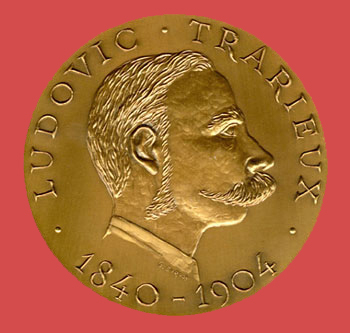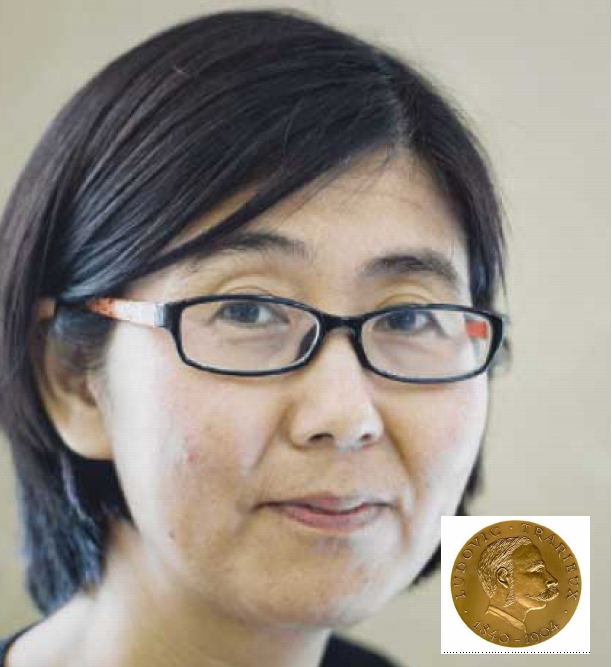
Internationaler Ludovic-Trarieux-Menschenrechtspreis 2016
Ludovic-Trarieux International-Human Rights Prize
2016
Prix
International des Droits de l'Homme Ludovic-Trarieux
2016
Premio Internacional de Derechos Humanos Ludovic Trarieux 2016
Premio Internazionale
per i Diritti Umani Ludovic
Trarieux 2016
Prêmio Internacional de Direitos Humanos Ludovic Trarieux 2016
Ludovic Trarieux
Internationale Mensenrechtenprijs 2016
Seit 1984
“Die Hommage von
Anwälten zu einem Anwalt”
“El homenaje de abogados
a un abogado ”
“L’hommage des avocats à un avocat ”
“The award given by
lawyers to a lawyer”
“L'omaggio degli avvocati ad un avvocato”
« De award
gegeven door advocaten aan een
advocaat »
THE
LUDOVIC-TRARIEUX PRIZE 1985 (PDF)
Wang Yu
(China)
erhielt
den
Internationalen Ludovic-Trarieux-Menschenrechtspreis 2016

China Anwältin
Wang Yu
Internationalen Ludovic-Trarieux-Menschenrechtspreis 2016
Eine
Jury, bestehend aus 22 europäischen Anwälte aus den Bars von Paris, Bordeaux,
Amsterdam, Berlin, Brüssel, Genf, Luxemburg, Roma, gemeinsam mit der Europäischen
Bar Institut für Menschenrechte
(IDHAE) und der Union Internationale des Avocats
(UIA) treffen in Athens Bar
Association Amt am 4. Juni
2016 und haben mit dem einundzwanzigste Ludovic Trarieux Menschenrechtspreis an den chinesischen Anwältin Wang Yu ausgezeichnet.
In der Nacht auf den 9. Juli 2015, die Rechtsanwältin
Wang Yu gemeinsam mit ihrem Ehemann und ihrem 16-jährigen Kind in Peking festgenommen
wurde. Wang ist
als Menschenrechtsaktivistin
bekannt. Seitdem wurden Hunderte Rechtsanwälte, Kanzleiangestellte
und deren Familienangehörige
eingeschüchtert, verhört, festgenommen oder
sind schlichtweg verschwunden.
Die chinesischen Behörden haben dem Sohn zweier
Menschenrechtler die Ausreise
nach Australien verweigert. Der 16-jährige Bao Mengmeng sei
auf dem Weg zum Flughafen von der Polizei gestoppt worden, wie seine Familie mitteilte. Er werde jetzt
überwacht und sei aufgefordert worden, sich nicht nach
dem Aufenthaltsort seiner Eltern zu erkundigen.
Er solle auch keine Rechtsberatung
in Anspruch nehmen. Auch seien ihm sein Pass und Wohnungsschlüssel weggenommen worden. Seine Handynummer solle er ändern.
Baos Mutter Wang Yu
war vor neun Tagen zusammen mit Anwaltskollegen und anderen Aktivisten festgenommen worden. Bao wurde ebenfalls festgesetzt, kam aber zwei Tage
später wieder frei. Seine Eltern sind jedoch
verschwunden. Der Jugendliche
wollte ursprünglich mit seinem Vater
nach Australien, wo er in die Schule
gehen sollte.
Wang Yu hatte Angeklagte in politisch sensiblen Fällen vertreten. Unter anderem verteidigte
sie die junge Frauenrechtlerin Li Tingting, die
ins Gefängnis kam, weil sie
eine Aktion gegen sexuelle Belästigung plante.
Lesen auch :
In Januar 2016, internationale Juristen appellieren an Chinas Präsidenten .
Wang Yu, 45,
from Ulanhot, Inner Mongolia, has becomed
the “Emblem of China’s Human Rights Crackdown”. As a Chinese human rights lawyer,
she is sadly known for being the first victim to be detained in the “709
Crackdown”, one of the harshest actions against the legal profession in China.
Wang Yu began
to practice as a lawyer in Beijing in May 2004, mainly working on commercial
cases. Following the Tianjin railway incident on May 4, 2008, she got into an
argument with rail employees when she was denied entry onto a train even though
she had a ticket. Several unidentified men assaulted Wang Yu. She filed a
complaint with the local police, but seven months later, she was charged with
“intentional assault”. The police officer revenged and on December 9, 2008,
instead of receiving a response to her complaint, Wang Yu was arrested.On November 24, 2010, after a questionable legal
process, she was sentenced on appeal to 2 years and six months in prison by the
Beijing Railway Transportation Court. While in prison, Wang Yu became aware of
widespread torture and mistreatment of prisoners. Her lawyer’s license was also
suspended afterwards and she was allowed to practice again in late 2012. She
decided “to improve China's human rights system through the legal system and
push for the rule of law."
Between 2011
and 2015, she actively worked as a human rights lawyer, undertaking challenging
legal cases involving clients who other lawyers feared to represent. Wang Yu
represented numerous victims of human rights violations, in particular, members
of vulnerable groups such as women, children, migrant workers, disabled people,
and ethnic and religious minorities. She also represented human rights
defenders and political dissidents. Among them:
- Liu Ming, a visually impaired person, in
a case known as the “Beijing First Case Regarding Discrimination against
Disability in Employment” (Beijing, 2013-2014);
- Falun Gong practitioners charged with
“Sabotaging Legal Enforcement by Using Heretical Religion”. Defense of these
every sensitive and politically charged cases certainly increased the risk that
Wang Yu herself would be subject to police retaliation. On 22 April 2015, as
she was representing Falun Gong member in Shenhe
District Court, Wang Yu was violently dragged out of court after she protested
to the judge because her female client was beaten.
- Ilham Tohti, a
Uyghur activist and economist sentenced to life imprisonment on
separatism-related charges (Xinjiang, 2014);
- Cao Shunli, a
woman human rights activist, who after being abducted at the airport, was
charged with “creating disturbance” and who eventually died in custody in 2014,
reportedly following a lack of adequate medical treatment (Beijing, 2013-2014);
- The “Five Feminists” who were charged in
March 2015 with “picking quarrels and provoking troubles” as they planned a
public awareness campaign against sexual harassment to coincide with International
Women’s Day (Beijing, 2015).
- Fan Mugen, an
eviction protester, who was found guilty of “intentional injury” and sentenced
to 8 years of imprisonment after he attacked members of a demolition gang who
came to raze his home and who assaulted his family (Jiangsu, 2013-2015);
- Wu Gan, a
prominent cyber activist who worked for Wang’s law firm, the Beijing Fengrui Law Firm, charged with “picking quarrels and
provoking trouble” and “inciting subversion of state power” after he supported
harassed lawyers working on a death penalty case involving defendants who had
been tortured to confess.
Wang Yu
cosigned statements and participated inactions urging increased protection for
human rights; supporting lawyers and activists arbitrarily sanctioned, harassed
or prosecute’requesting abolition of re-education
through labor; and denouncing death penalty convictions. Moreover, Wang Yu also
submitted legislative suggestions and petitions, co-signed open letters and
participated in public discussions on many human rights issues, including
discrimination against gender, children’s rights and protection of human rights
lawyers.
Because of her
human rights activities, Wang Yu had been consistently harassed, threatened,
assaulted by the police, and smeared in the state-run media. On June 2015, her
imprisonment in 2008 became the basis for a smear campaign in Xinhua, when a
published article portrayed Wang Yu as a violent and deceitful lawyer who had
refused to pay the financial penalty for her actions.
On July 9, 2015,
early in the morning, the electricity and Internet were shut off at Wang Yu’s
home, the front door was pried open, and she was taken away. She had just sent
a text message to friends saying that her internet and electricity had been cut
off and that people were trying to break into her home. She remained missing
for a few days before her relatives knew she had effectively been arrested. The
same day Bao Longjun, her
husband and a trainee lawyer, and Bao Zhuoxuan, their 16-year-old son, were taken into custody at
Beijing Capital Airport. Their son was handed over to his aunt and his passport
was confiscated. He then went to two of his parents’friends
with the intention to go to the United States via Thailand, but he was
apprehended in Burma. He was heavily interrogated, and threatened. Today, the
teenager is under house arrest at his grandparents’home
in Mongolia. The neighbours’homes had been adopted
for the 24-hour monitoring.
Soon after
Wang’s arrest, law firm staff and their relatives have been detained, arrested,
held incommunicado, summoned, forbidden from leaving the country or otherwise
have had their freedom temporarily restricted. Many of them worked at Wang’s
law firm. The head of the firm, Zhou Shifeng, was
among those targeted. Since her arrest, Wang Yu has been the focus of a
ferocious attack in state media. An official newspaper of the Chinese Communist
Party, The People’s Daily, accused the Fengrui Law
Firm of being a criminal gang and part of a criminal operation to ‘undermine
social stability’.
Wang Yu and her
husband were placed under “residential surveillance in a designated location”.
Chinese regulations allow for secret detention in an undisclosed location for a
period of up to six months. On January 9, 2015 at the end of the six-month
period, Wang Yu, was formally charged with “subversion against the State”, and
risks a maximum sentence of life imprisonment or not less than 10 years of
fixed-term imprisonment. Her husband, Bao Longjun, was accused of incitation for the same crime. She
is currently imprisoned at Tianjin No. 1 Detention Center.
MEMBRES DU JURY
2016
(par ordre alphabétique)
Dominique Attias
Brigitte Azéma-Peyret
Isabelle Bühler Galladé
Zbigniew Cichon
Maxime Delhomme
Nicole Derhy
Carlos Fatàs Mosquera
Bertrand Favreau
Julie Goffin
Marie-France Guet
Bernd Haüsler
Christina Kountouri
Charilaos Ladis
Anton Giulio
Lana
Fanny Margairaz
Mario Melillo
Christophe Pettiti
Agaath S. Reijnders-Sluis
Sophia Spilotopoulos
Adrie van de Streek
Haris Tagaras
Jean-Jacques Uettwiller
“Die Hommage von
Anwälten an einen Anwalt”
Der
Internationale Menschenrechtspreis Ludovic-Trarieux wird einem
Rechtsanwalt ohne Ansehen seiner Nationalität oder Kammerzugehörigkeit verliehen, „der sich durch seine Arbeit, seine Aktivitäten oder sein Leiden um die Achtung
der Menschenrechte, um die Gewährung rechtlichen Gehörs, um die Herrschaft des Rechts im den Kampf gegen Rassismus und Intoleranz
in all ihren Formen verdient gemacht hat”.
Dieser
Preis ist die älteste und renommierteste
Auszeichnung für einen Rechtsanwalt. Oftmals imitiert oder nachgemacht, bleibt er die einzige europäische Anerkennung im Bereich Menschenrechte,
dessen Dotierung einem Anwalt zugutekommt.
Die Idee zu diesem Preis geht
auf einen Ausspruch Ludovic Trarieux
(1840-1904) zurück, der 1898 zur
Zeit der Dreyfus-Affäre in Frankreich die Liga für Menschen- und Bürgerrechte
gegründet hat.
Der Preis wurde
zum ersten Mal am 27. März 1985 Nelson Mandela zugesprochen, der 23 Jahre in den
Gefängnissen Südafrikas verbracht hat. Er wurde am 27. April 1985 offiziell seiner Tochter übergeben. Dies war die erste
Preisverleihung überhaupt. Seit 2003 ist
er eine jährlich
wiederkehrende Ehrung eines Rechtsanwalts durch andere Rechtsanwälte.
Der Preisträger wird gemeinsam vom Menschenrechtsinstitut
der Rechtsanwaltskammer Bordeaux, dem
Institut zur Fortbildung in Menschenrechtsfragen
der Rechtsanwaltskammer Paris, dem
Menschenrechtsinstitut der Rechtsanwaltskammer
Brüssel, der Unione forense per la tutela dei diritti dell'uomo
(Rom), die Rechtsanwaltskammern Berlin, Genf, Amsterdam, Luxemburg, der Union Internationale
des Avocats (UIA) und dem Menschenrechtsinstitut
der europäischen Rechtsanwälte
(IDHAE). vergeben. Die Verleihung findet abwechselnd in einer der Städte statt, in der diese Einrichtungen ihren Sitz haben.
1985: Nelson MANDELA (South Africa)
1992: Augusto ZÚÑIGA PAZ (Peru) †
1994: Jadranka
CIGELJ (Bosnia-Herzegovina)
1996 Nejib HOSNI (Tunisia) and Dalila MEZIANE
(Algeria).
1998 ZHOU Guoqiang
(China)
2000 Esber
YAGMURDERELI (Turkey)
2002 Mehrangiz KAR (Iran)
2003 Digna OCHOA and Bárbara ZAMORA (Mexico)
2004: Akhtam NAISSE (Syria)
2005: Henri BURIN DES ROZIERS (Brazil)
2006: Parvez IMROZ (India)
2007 : René GÓMEZ MANZANO (Cuba)
2008 : U AYE MYINT (Burma)
2009 : Beatrice MTETWA (Zimbabwe)
2010 : Karinna
MOSKALENKO (Russia)
2011 : Fethi TERBIL
(Libya)
2012 : Muharrem
ERBEY (Turkey)
2013 : Vadim KURAMSHIN (Kazakhstan)
2014 : Mahienour
el-MASSRY (Egypt)
2015 : Waleed Abu al-KHAIR (Saudi Arabia)